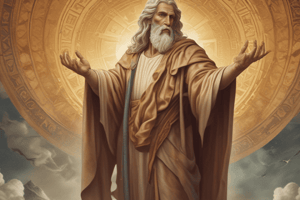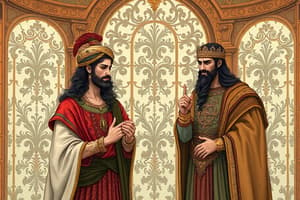Podcast
Questions and Answers
What type of love is 'Agape' primarily known for?
What type of love is 'Agape' primarily known for?
- Romantic love
- Familial love
- Self-love
- Brotherly, sacrificial, unconditional love (correct)
What does 'Anthropos' generally refer to?
What does 'Anthropos' generally refer to?
- God
- Man (human) (correct)
- Angel
- Spirit
What does 'Aggelos' mean?
What does 'Aggelos' mean?
- Teacher
- Messenger, angel (correct)
- Disciple
- Leader
What is the English definition of the Greek word 'Ego'?
What is the English definition of the Greek word 'Ego'?
What does 'Theos' refer to?
What does 'Theos' refer to?
What is the meaning of 'Iesous'?
What is the meaning of 'Iesous'?
What is the English translation of 'Kerugma'?
What is the English translation of 'Kerugma'?
Which of the following is the definition of 'Koinonia'?
Which of the following is the definition of 'Koinonia'?
What is 'Logos' referred to as?
What is 'Logos' referred to as?
What is 'Nomos'?
What is 'Nomos'?
Which of the following defines 'Pneuma'?
Which of the following defines 'Pneuma'?
What does 'Sabbaton' signify?
What does 'Sabbaton' signify?
What is the English meaning of 'Charis'?
What is the English meaning of 'Charis'?
What does 'Christos' mean?
What does 'Christos' mean?
What does the term 'Pax Romana' mean?
What does the term 'Pax Romana' mean?
What is Pentecost also known as?
What is Pentecost also known as?
In the context of the early church, what does 'The Way' refer to?
In the context of the early church, what does 'The Way' refer to?
What is Antioch known for being?
What is Antioch known for being?
What did the Gallio Inscription help determine?
What did the Gallio Inscription help determine?
Flashcards
Agape
Agape
Brotherly, sacrificial, unconditional love.
Anthropos
Anthropos
Man, a human being.
Aggelos
Aggelos
Messenger, angel.
Ego
Ego
Signup and view all the flashcards
Theos
Theos
Signup and view all the flashcards
Iesous
Iesous
Signup and view all the flashcards
Kerugma
Kerugma
Signup and view all the flashcards
Koinonia
Koinonia
Signup and view all the flashcards
Cosmos
Cosmos
Signup and view all the flashcards
Logos
Logos
Signup and view all the flashcards
Nomos
Nomos
Signup and view all the flashcards
Pneuma
Pneuma
Signup and view all the flashcards
Sabbaton
Sabbaton
Signup and view all the flashcards
Charis
Charis
Signup and view all the flashcards
Christos
Christos
Signup and view all the flashcards
Pax Romana
Pax Romana
Signup and view all the flashcards
Pentecost
Pentecost
Signup and view all the flashcards
The Way
The Way
Signup and view all the flashcards
Justification
Justification
Signup and view all the flashcards
Study Notes
Greek Definitions
- Agape: Brotherly, sacrificial, unconditional love.
- Anthropos: Refers to man or human.
- Aggelos: A messenger or angel.
- Ego: Denotes "I," "me," or "my."
- Theos: Means God, specifically referring to the Trinity.
- Iesous: Jesus, meaning ‘Jehovah is salvation’.
- Kerugma: Good news.
- Koinonia: Fellowship, communion, community.
- Cosmos: Refers to the world.
- Logos: Word, Scriptures and Jesus, expresses what God is like.
- Nomos: Ten Commandments, Law and Writings of Moses, all make up the Old Testament.
- Pneuma: Means the Holy Spirit.
- Sabbaton: Refers to the Sabbath.
- Charis: Means grace.
- Christos: Refers to Christ
New Testament Terms Definitions
- Pax Romana: Latin for "the Roman Peace", began in the 1st century BC, helped Christianity spread in the Mediterranean.
- Pentecost: Jewish Feast of First Fruits, held 50 days after Passover, the Spirit poured out on believers in Jerusalem, beginning the church.
- Tongues: Refers to languages.
- The Way: Refers to the early Christian movement and its followers.
- Antioch: A large city in the Roman Empire, a hub for trade and culture and an important town for Christianity.
- Gallio Inscription: Discovered at Delphi, references Junius Gallio, used as a timeline indicator for Paul's 2nd missionary trip.
- Herod Agrippa I: Last Jewish King of Judea, killed James.
- Herod Agrippa II: Son of Herod Agrippa I, played a role in the First Jewish-Roman War, listened to Paul's defense.
- Justification: God declares a person righteous, through faith in Jesus Christ's death and resurrection.
- Sanctification: God progressively makes the believer holy, a process following justification.
- Substitutionary Atonement Theory: Sin, punishable by death, requires a perfect sacrifice, Jesus is the perfect lamb.
- Moral Influence Theory: Jesus' sacrifice demonstrates His love.
- Ransom Theory: God trades His Son for sinners, Jesus overpowers Satan.
- Gnosticism: Blend of Christian, Jewish, and Greek ideas, heresy, salvation through special knowledge.
- Bishop: A leader in the early church.
Short Answer Questions
- Two ways Hellenization affected the early Christian church: Greek culture spread, affecting language, communication, and philosophy.
- Examples of "outsiders" welcomed: Cornelius the Centurion, the Ethiopian eunuch, and Lydia.
- Paul spent eighteen months in Corinth during his second missionary journey.
- According to Paul, faith is hope and belief for the unseen.
- Faith, hope, and love are more important than spiritual gifts.
Essay-Length Answer Questions
- Prominent philosophies in the early Christian world included Platonism and Stoicism.
- Platonism includes true forms, one good, and virtue as knowledge.
- Stoicism emphasizes fate, self-control, wisdom, courage, temperance, and justice.
- The Jerusalem Council debated whether Gentiles needed circumcision for salvation, the final decision was not to require it.
- Paul's view of salvation: It is a process, accepting Christ starts a lifelong transformation, verses include Romans 3:20, Romans 4:5, and Romans 5:1.
- Intra-church conflicts in early Christian churches included factions, immorality, spiritual gifts, Paul urged love, gentleness, patience, and inclusion.
- In 1 Timothy 2:12, Paul said “I do not permit a woman to teach or to exercise authority over a man; rather, she is to remain quiet", could be due to false teachings and disproportionate influence.
Studying That Suits You
Use AI to generate personalized quizzes and flashcards to suit your learning preferences.




